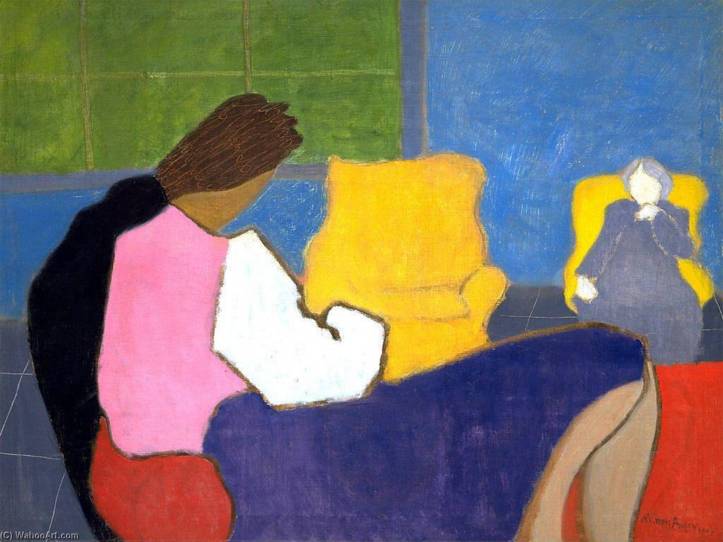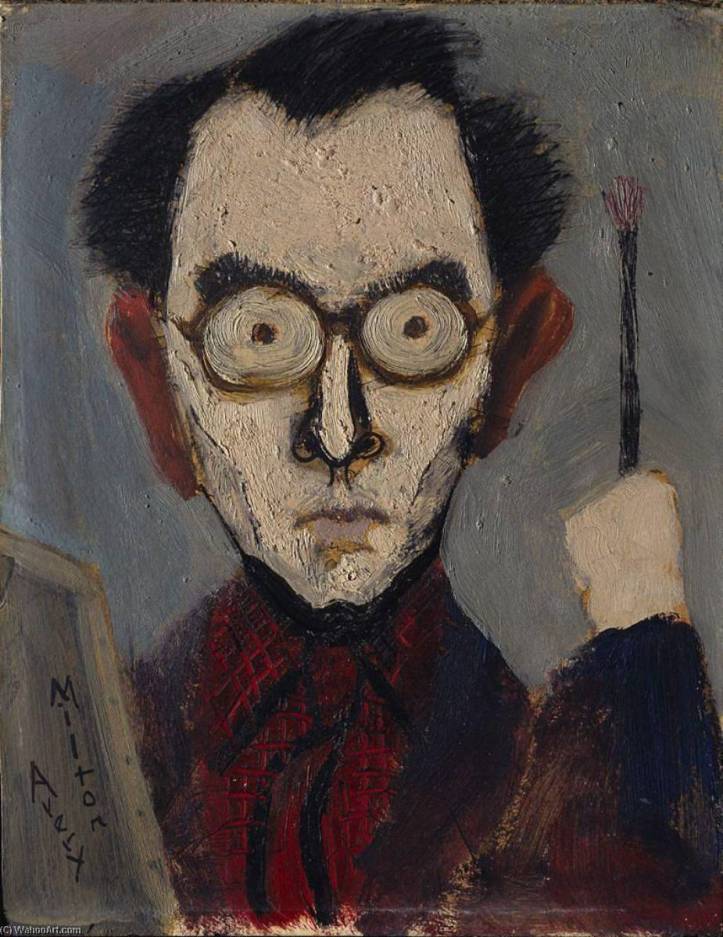- What Is The Difference Between Reacting And Responding?
 Sally and Sara – Milton Avery. Wikioo
Sally and Sara – Milton Avery. Wikioo
“Every day try to convert your reactions to responses. Reactions are always instinctive, whereas responses are always well thought of, just and right to save a situation from going out of hand, to avoid cracks in relationship, to avoid taking decisions in anger, anxiety, stress or hurry.”
Abhishek Ratna
This quotation above neatly sums up the difference between the two styles of communicating in relation to another person.
The key is to understand the importance of thinking before speaking. Of course, there are times when spontaneity is necessary and delightful, but we must also be able to detect when we need to have a more measured response and think carefully about possible consequences.
Let us take a more detailed look:
- Reacting.
 Portrait of Raphael Soyer – Milton Avery. Wikioo.
Portrait of Raphael Soyer – Milton Avery. Wikioo.
“I shoot from the hip.”
Gordon Ramsay.
Lack of impulse control and ‘shooting from the hip’ are ways of describing an instant, unthought-about reaction.
Often this is an angry remark, a tirade of insults, or simply an over-hasty response that we might regret later on, when we have had time to think it through.
It may also be that such a quick-fire, point-blank comment is the first thing that comes to mind, impromptu, unprocessed, without thinking of the consequences….. without thinking at all.
Just as an animal reacts immediately to a stimulus, so some people are unable to stop themselves from giving an instinctive retort.
 Temper Tantrum – Louise Joséphine Bourgeois. Wikioo.
Temper Tantrum – Louise Joséphine Bourgeois. Wikioo.
Such impulsiveness can cause much harm to self and other. With no time for consideration, preparation, or self-control, words are uttered that can be harsh, abusive and ultimately can lead to loss of face….. or shame and defeat.
“The best fighter is never angry.”
Lao Tzu
Sometimes, when the other pushes us beyond our limit, provoking and taunting, we may lose our temper. After all, we are only human.
However, it is important to attempt to identify one’s own triggers for anger, and try one’s hardest to have control over the self, maybe going for psychological help if anger feels regularly out of control.
 Anne-Marie Zanetti – There’s Always Another Way [2021] Oil on Canvas.Gandalf’s Gallery. Flickr.
Anne-Marie Zanetti – There’s Always Another Way [2021] Oil on Canvas.Gandalf’s Gallery. Flickr.
“Dear Self – Don’t allow anyone to trigger you. Let it go. Walk away. You’ll be proud of yourself later. The next time you feel yourself being triggered emotionally, tell yourself that you will allow the emotion to pass before you will react or speak. Tell yourself that you are aligned with peace and wellness and that fighting and arguing no longer soothes your soul. This does not mean that you will not speak up and be assertive-no. Instead, it means that you will be mindful of what you let bother you and even more aware of how you handle each situation.”
Sylvester McNutt III
- Responding.
 Waiting for an Answer – (John William Godward)
Waiting for an Answer – (John William Godward)
“Between stimulus and response there is a space. In that space is our power to choose our response. In our response lies our growth and our freedom.”
Attributed to Viktor E. Frankl
This quotation, which some dispute came from Frankl himself, nevertheless does encapsulate much of what Frankl believed. Therefore, I will take the liberty of (weakly) asserting that these are his words, for the purposes of this post!
The writings of Frankl, a psychiatrist and neurologist, have been meaningful for many people. He survived four concentration camps, where he lost most of his family.
His wisdom shines out in his most popular book, Man’s Search for Meaning.
 “Between stimulus and response there is a space………”
“Between stimulus and response there is a space………”
Let us look more closely at the full Frankl quotation above. He begins by talking about stimulus and response. Then, there is a space. It is at this point that we have a choice.
We may not think, in the heat of the moment, that we have a choice, but we genuinely do have such a ‘power.’ What is this power and this choice that we have?
We have the power to decide that it is our responsibility to respond maturely and appropriately….. and no-one else’s, no matter how provoking they might appear.
It is important that we do not blame others for triggering our anger. That would be dodging the issue and blame-shifting. It is our anger.
“Ultimately, the only power to which man should aspire is that which he exercises over himself.”
Elie Wiesel
We have the choice to extend and use the space after the original stimulus to feel and to think. We have the choice and the power to retreat, for a few minutes, or longer, into the quiet garden of our soul, an aspect of our inner landscape.
 Quiet Garden – Jean Warin. Wikioo.
Quiet Garden – Jean Warin. Wikioo.
If we truly can grasp what is happening to us in the precious, silent, space between the stimulus and the response, then we can gather together all our energy to formulate a reply that is balanced and clearly thought through.
“There’s a much deeper and meaningful conversation being conducted in the space between the lines.”
Dave Cenker
We need to get in touch with what we are feeling, when we receive the stimulus, so that we can be in control of that feeling and adjust our ways of thinking about it.
The Importance of The Pause.

“Practice the pause. Pause before judging. Pause before assuming. Pause before accusing. Pause whenever you’re about to react harshly and you’ll avoid doing and saying things you’ll later regret.”
Lori Deschene
If we take a few moments to calm down, perhaps to leave the room, to allow ourselves some thinking space, often the feelings of rage will give way to some understanding or self and other.
Jack Cornfield, who is Buddhist, sees such pauses as ‘sacred,’ allowing us to get in touch with the best parts of ourselves:
“Try this in your next argument or conflict: Take a pause. Hold everyone’s struggle in compassion. Reflect on your highest intention. Whenever things get difficult, pause before you speak and sense your wisest motivation. From there, it will all flow better.”
 Variation: Anger – Alexej Georgewitsch Von Jawlensky. Wikioo.
Variation: Anger – Alexej Georgewitsch Von Jawlensky. Wikioo.
“Never respond to an angry person with a fiery comeback, even if he deserves it…Don’t allow his anger to become your anger.”
Bohdi Sanders
I will end this post with some useful and wise quotations…. which will make us all think….
 Lynn Friedman. Hungry Dog Salivates at Real Food Deli Counter.Flickr.
Lynn Friedman. Hungry Dog Salivates at Real Food Deli Counter.Flickr.
“Sometimes, you must refrain from doing things you want so bad.”
Toba Beta
“Self-discipline is often disguised as short-term pain, which often leads to long-term gains. The mistake many of us make is the need and want for short-term gains (immediate gratification), which often leads to long-term pain.”
Charles F. Glassman
When things look like they are getting heated, do remember that valuable space….. and use its rich and precious potential to the full!
 Caïn by Henri Vidal. Wikimedia Commons.
Caïn by Henri Vidal. Wikimedia Commons.
“Every great mistake has a halfway moment, a split second when it can be recalled and perhaps remedied.”
Pearl S. Buck
©Linda Berman.

Brilliant, thank you so much, just what I needed to read this morning 🥰
LikeLiked by 1 person
Wonderful timing then! Thanks so much Carol! So glad you liked the post. 🌹
LikeLike
I am so guilty of ‘blowing my top’….WILL TRY HARDER to pause and think! Cheers xx
[cid:14a3f71c-e5bd-467f-8299-54c206a6390a] cheers, Janette M. Byrne B.Sc.(Hons.) B.A.(Hons.) M.A.Fine Art http://www.neoartists.co.uk/artists.asp ruthdavies@elasticspace.co.ukruthdavies@elasticspace.co.uk
LikeLiked by 1 person
Aww thanks Janette! Lots of love ❤️
LikeLike
“The history of arguments “ presented by Rory Stewart which one can listen to on BBC Sounds is quite fascinating. Interesting email Linda
LikeLiked by 1 person
Thanks Leslie! Will follow up.
LikeLike
Great post, very relevant to the human experience. I relate on a personal level to this struggle. Thank you for this great description with pithy quotes.
LikeLiked by 1 person
Thanks so much Rebecca. I’m so glad you find this post and the quotes relevant.
LikeLiked by 1 person
[…] However, as I indicated in Part 1 of this post, it can also be freeing to understand and accept that we only have limited control, in that, although we cannot control the world around us, we can choose how we might respond. (See also my post on reacting and responding.) […]
LikeLike